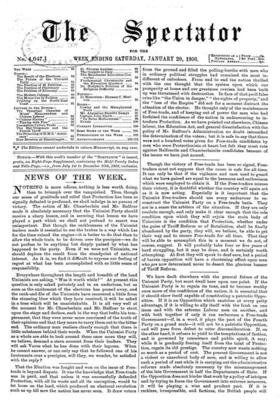That the Election was fought and won on the issue
of Free- trade is beyond dispute. It was the knowledge that Free-trade was in peril, and that unless it was successfully defended Protection, with all its waste and all its corruption, would be let loose on the land, which produced an electoral revolution such as up till now the nation has never seen. It drew voters from the ground and filled the polling-booths with men who in ordinary political struggles had remained the most in- different of onlookers. From end to end the nation thrilled with the one thought that the system upon which our prosperity at home and our greatness oversea had been built up was threatened with destruction. In face of that peril false cries like "the Union in danger," "the rights of property," and the "loss of the Empire" did not for a moment distract the attention of the elector. He thought only of the maintenance of Free-trade, and of keeping out of power the men who bad forfeited the confidence of the nation in endeavouring to in- troduce Protection. As we have pointed out elsewhere, Chinese labour, the Education Act, and general dissatisfaction with the policy of Mr. Balfour's Administration no doubt intensified the determination of the voters; but it is safe to say that there were not a hundred votes given for Free-trade candidates by men who were Protectionists at heart but felt they must vote against Balfomite and Cha.mberlainite candidates because of the issues we have just named.


































